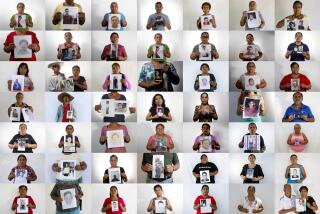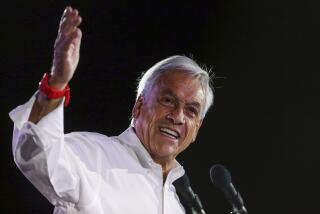Chile’s Military Agrees to Look Into Disappearances
- Share via
SANTIAGO, Chile — In a historic advance in this nation’s transition toward full democracy, the armed forces agreed Tuesday to investigate the disappearances of about 1,000 victims of the former military dictatorship.
The accord was achieved by a round table of armed forces chiefs, human rights leaders, clergy and other prominent citizens who have been negotiating for 10 months. It represents a notable change of attitude on the part of military chiefs. Unlike their counterparts in other Latin American countries, the Chilean armed forces have not apologized for or even acknowledged the atrocities they committed during the dictatorial past.
The apparent breakthrough indicates that Chile’s slow-moving democratic transition may be finally gathering momentum.
“This agreement makes it possible to revive the best of our republican tradition,” said President Ricardo Lagos, a Socialist who suffered exile and arrest after the military overthrew Salvador Allende in 1973. “In Chile, never again will political opponents be assassinated or disappear. Never again will agents of the state engage in systematic torture.”
Security forces waged a campaign of terror after the coup, killing about 3,000 people and kidnapping, torturing and persecuting tens of thousands more, according to the findings of a government commission after the return to democracy in 1990. About 1,000 of those believed dead remain unaccounted for; it is likely they were buried in clandestine graves or dumped out of aircraft into the Pacific Ocean or Andes Mountains.
The army, navy, air force and national police will have six months to gather information about their whereabouts from active and former soldiers. Those providing information will be assured of anonymity, officials said.
In an excerpt of the written agreement published Tuesday by the Chilean newspaper La Segunda, military representatives on the round table said that they don’t have the information, but that they are willing to help track it down.
Lagos will receive the report from the armed forces and turn over the information to the court system.
Chile’s proud and powerful armed forces have long insisted that the 1973 coup by former dictator Augusto Pinochet saved the nation from Marxist chaos. And they have expressed solidarity with the ailing Pinochet, 84, as foreign and Chilean authorities try to prosecute him for human rights abuses.
But the culture of uniformed intransigence appears to be weakening. The military has accepted prosecutions of former commanders, including Pinochet himself. Officers have been charged with kidnapping, a crime that is considered ongoing if the victim remains missing and, in that case, is not covered by amnesty laws.
An appellate court recently stripped Pinochet, a self-appointed senator for life, of parliamentary immunity from prosecution--another landmark moment for democracy here. Pinochet has appealed the ruling to the Supreme Court.
A leading group of relatives of the disappeared protested the civilian-military accord Tuesday outside the presidential palace. The relatives have opposed the negotiations from the start, fearing a maneuver to ensure immunity for the military.
Nonetheless, there was a genuine sense of triumph in government circles. The credibility of the deal is enhanced by the credentials of the round-table negotiators, such as veteran human rights lawyer Pamela Pereira, whose father was killed by the military regime.
*
Times staff writer Rotella reported from Buenos Aires and special correspondent Vergara from Santiago.
More to Read
Sign up for Essential California
The most important California stories and recommendations in your inbox every morning.
You may occasionally receive promotional content from the Los Angeles Times.













